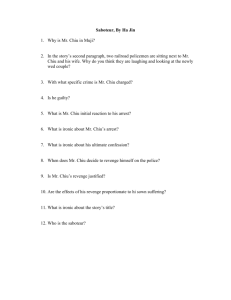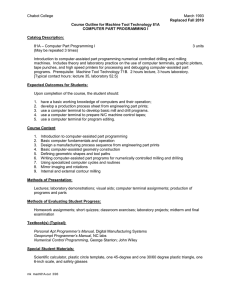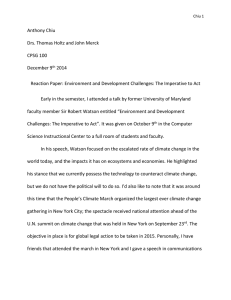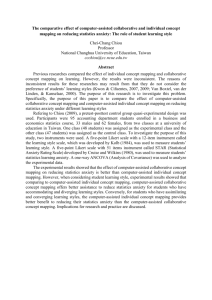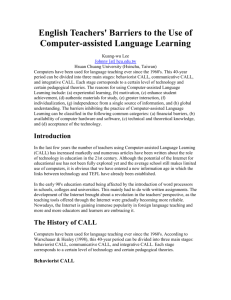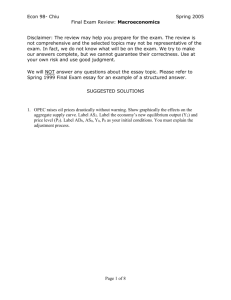zienab 610
advertisement
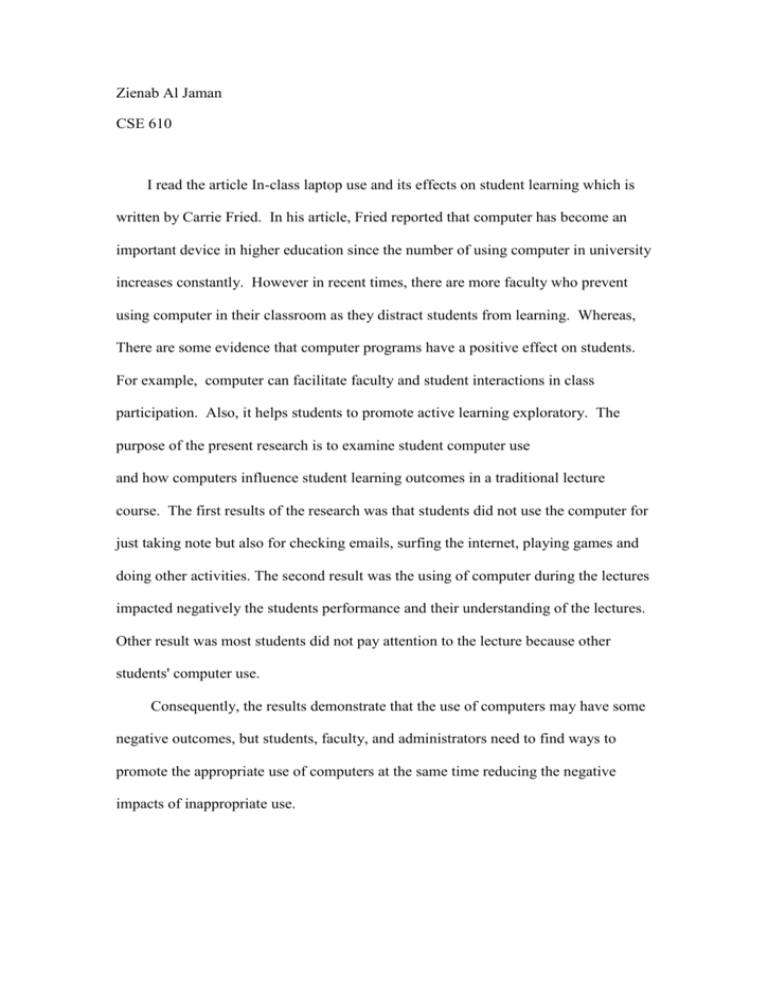
Zienab Al Jaman CSE 610 I read the article In-class laptop use and its effects on student learning which is written by Carrie Fried. In his article, Fried reported that computer has become an important device in higher education since the number of using computer in university increases constantly. However in recent times, there are more faculty who prevent using computer in their classroom as they distract students from learning. Whereas, There are some evidence that computer programs have a positive effect on students. For example, computer can facilitate faculty and student interactions in class participation. Also, it helps students to promote active learning exploratory. The purpose of the present research is to examine student computer use and how computers influence student learning outcomes in a traditional lecture course. The first results of the research was that students did not use the computer for just taking note but also for checking emails, surfing the internet, playing games and doing other activities. The second result was the using of computer during the lectures impacted negatively the students performance and their understanding of the lectures. Other result was most students did not pay attention to the lecture because other students' computer use. Consequently, the results demonstrate that the use of computers may have some negative outcomes, but students, faculty, and administrators need to find ways to promote the appropriate use of computers at the same time reducing the negative impacts of inappropriate use. The second article I read, Computer-assisted second language vocabulary instruction: A meta-analysis, which was written by Chiu. The author explained that there is an increasing attention to integrate computer instruction for language learning and teaching. Especially, vocabulary which is the foundation step to mastering the language for English language learners. He demonstrated some methods to acquisition second language vocabulary from previous studies such as dictionary use, games, and computer-assisted language learning programs. Most previous studies tried to investigate the efficiency of the computer in learning vocabulary. There are many computer based methods, such as flash cards, to learn vocabulary. As a result of the conflict result in use computers for second language learning vocabulary, Chiu sought to get a better understanding of the various studies. The Chiu's study concerned on the effect of computer-mediated instruction in second language vocabulary with regard to four factors: treatment duration, the educational level of participants, game-based learning, and the role of teachers. The first finding of the study was that students who received computer-assisted language learning learned vocabulary better. Also, the study demonstrated that high school or college students can benefit more from computer assisted language learning programs than elementary students. The third finding of the study was that second language vocabulary learning performed better without games than with the help of the games. Finally, the study showed that learning vocabulary without the assist of the teacher is better than the aid of the teachers. In conclusion, students can acquisition second language vocabulary through the computer-assisted programs efficiently. The study that Chiu did demonstrates the general effectiveness of second language computer-assisted vocabulary instruction. This study will help future research of how computer-assisted programs helps second language students to gain vocabulary better. Reflection I found the article was very informative. Many of the ideas that the others presented I agreed with. Some students use their laptops during the classroom badly like playing games, looking to different website, and chatting with their friends. Also, using laptops during the class will prevent them from understanding the lecture. They will not focus to listen to the lecture and take note at the same time which lead to reduce students performance. The second article written by Chiu was interesting. However, there was a point that I would like to argue against. I think that second language students can gain vocabulary quickly through games. These computer games will provide an interesting environment to learn instead of the traditional way. References Chiu, Y. H. (2013). Computer‐assisted second language vocabulary instruction: A meta‐analysis. British Journal of Educational Technology, 44(2), E52-E56. Fried, C. B. (2008). In-class laptop use and its effects on student learning. Computers & Education, 50(3), 906-914.
